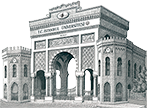Biotechnology
Biotechnology Program
Biotechnology is one of the fastest growing areas of research in both universities and industrial fields. Although the beginning of the biotechnology has started with the agricultural activities of human, recently biotechnology becomes one of the major area of research encompassing the applications of various basic science and engineering disciplines for exploration of living organisms and/or their products in the fields of industry, medicine and agriculture. The biotechnology program comprises researchers who can carry out the studies in the fields of plant genetics, molecular cancer, stem cells,nanotechnology microbial biotechnology, metagenomics, environmental biotechnology and molecular markers. The biotechnology program is recently conducting MSci and PhD degrees.
CLICK HERE for The Introductory Brochure
CLICK HERE for Further Information About The MSc Program
CLICK HERE for Further Information About The PhD Program

-Mahmut Çalışkan is a Professor in Biotechnology Division of Biology Department at Istanbul University. He obtained his first degree, BSc, in Middle East Technical University, Ankara and attended to University of Leeds, Department of Genetics, England for his PhD studies. His main research areas include the role of germin gene products during early development, genetic variation among organisms and the characterization and biotechnological use of halophilic archaea.
Further information: https://avesis.istanbul.edu.tr/mahmut.caliskan

Assoc. Prof. Dr. Mehmet Rıfkı TOPÇUL
-Mehmet R. TOPÇUL is an Associate Professor in Biotechnology Division of Biology Department at Istanbul University. He obtained his BSc from Istanbul University. He attended to Istanbul University, Institute of Sciences, Radiobiology for his PhD. He is director of Advanced Stem Cell &Biomolecular Technology Research Laboratories in University of Istanbul. His research interests have involved cancer molecular biology, oncology, breast cancer and gynecological cancers, genetics, targeted therapies, nanotechnological drugs, tumour cell inhibitors, cancer stem cells. He has honored as International Selected Member by European Society for Radiotherapy and Oncology (ESTRO) and American Society for Therapeutic Radiotherapy and Oncology (ASTRO).
Further information: https://avesis.istanbul.edu.tr/topcul

Assoc. Prof. Dr. Nazmiye Özlem ŞANLI
- Nazmiye Özlem ŞANLI is an associate professor in Biotechnology Division of Biology Department at Istanbul University. She obtained her BSC degree in Istanbul University and attended to Istanbul University, Institute of Sciences for her PhD. Her main research areas include the evaluation of the effectiveness of natural and synthesized antibacterial agents, biofilm, applications of biocidal products / treated (finished) articles and their activity tests, occupational health and safety in the laboratory.
Further information: https://avesis.istanbul.edu.tr/nosanli
Further Information: https://avesis.istanbul.edu.tr/sevcan.aydin
Asst. Prof. Dr. Şeref GÜL is a faculty member in the Division of Biotechnology at the Biology Department of the Faculty of Science at Istanbul University. He received his undergraduate degree from Boğaziçi University, Faculty of Science, Department of Chemistry. He received his master's degree from Boğaziçi University and Michigan State University. He completed his doctorate in Koç University, Department of Chemistry and Biological Engineering. His main research interests include understanding the circadian clock mechanism and circadian clock-disease relationships, drug design and chronotherapy studies.
Further Information: https://avesis.istanbul.edu.tr/serefgul


